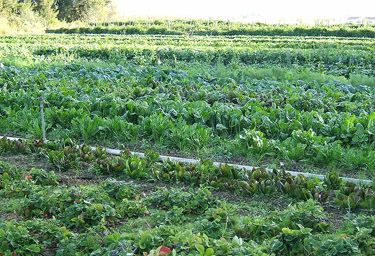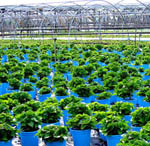Comparing organic vs. conventional agriculture on biodiversity...
 Agriculture,
Agriculture,  Plants
Plants  Organic cultivation of mixed vegetables on farm in Capay, California.A new study finds that organic farming promotes biodiversity compared to conventional agricultural practices. While past research has found similar results, this particular study is groundbreaking in that it detected ecological benefits from organic farming at both a local and a landscape level.
Organic cultivation of mixed vegetables on farm in Capay, California.A new study finds that organic farming promotes biodiversity compared to conventional agricultural practices. While past research has found similar results, this particular study is groundbreaking in that it detected ecological benefits from organic farming at both a local and a landscape level.
Researchers looked at the uncultivated, semi-natural borders between organic and conventional agricultural fields in Sweden. They found that the borders between organic fields had significantly higher plant species richness and abundance. The researchers hypothesize that this is likely due, at least in part, to the unintentional impact that herbicides can have on non-target species.
This is good news and not just for plants. Increases in plant species diversity likely trickle up the food chain benefiting the insects that eat plants (and the birds that eat insects).
They also found landscape-scale benefits from chemical free farming. In landscapes in which organic agriculture dominated, both organic and conventional farms had higher plant species richness than they did in conventional landscapes. In other words, the dominant agricultural practice across a landscape influences the biodiversity on all the farms in the area - regardless of whether they're organic or conventional.
The local benefit of chemical-free farming on adjacent semi-natural areas is easy to understand. But why the benefit at a landscape-scale? The researchers write:
"In landscapes with a high proportion of habitats affected by organic farming some plant species seem to be able to maintain populations large enough to avoid extinction, whereas populations in organic field borders in a sea of conventionally managed fields may be too small and isolated for persistence."
This study shows that organic farming on a landscape scale may be able to compensate somewhat for the overall declines in biodiversity caused by agricultural intensification worldwide.
--Reviewed by Rob Goldstein
Rundlöf, M., Edlund, M., & Smith, H. (2009). Organic farming at local and landscape scales benefits plant diversity Ecography DOI: 10.1111/j.1600-0587.2009.05938.x




Reader Comments